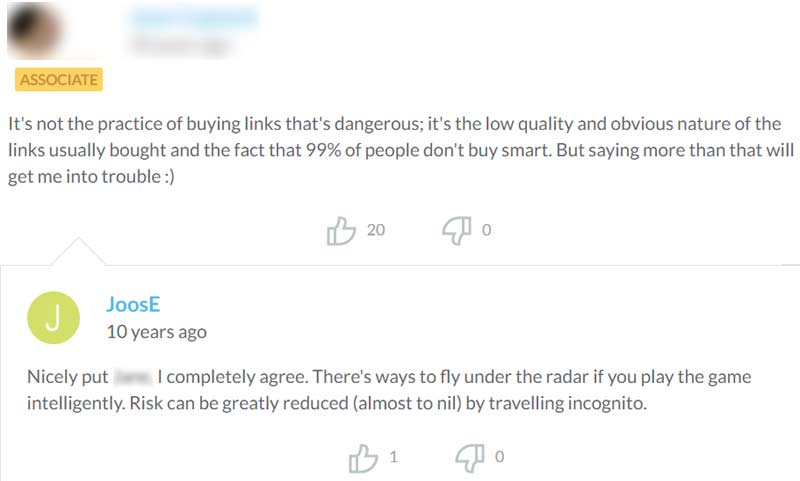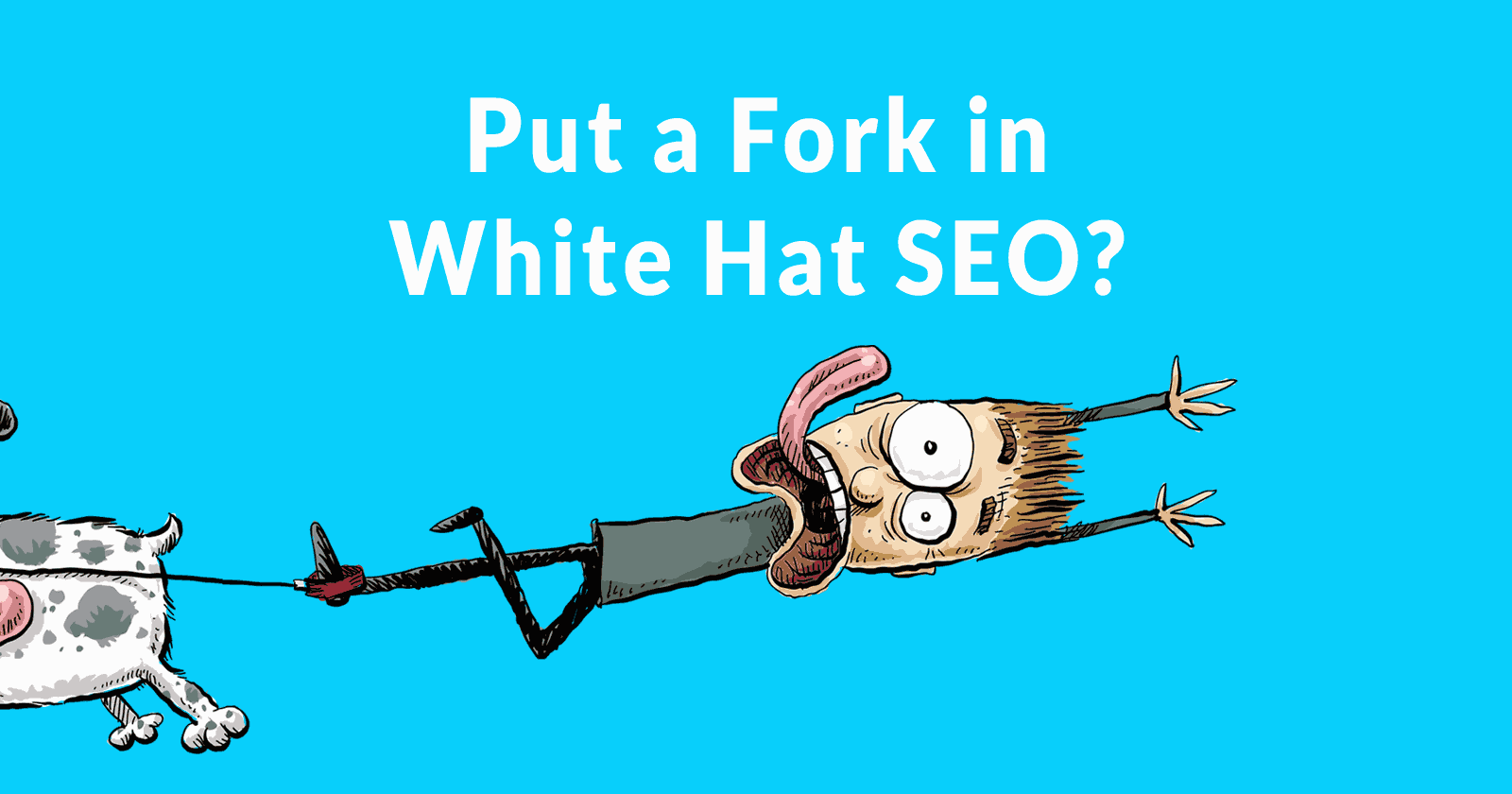Some in the SEO industry promote themselves as white hat. It means they are ethical. Those same SEOs posit that black hat SEOs are the bad guys. Turns out that black and white hat thing is not as black and white as we’ve been led to believe.
The following are seven commonly held ideas about black hat SEO and surprising facts that show how much white hat and black hat SEO have in common.
History of White Hat SEO
Some may be surprised to read what follows. But I’ve been in this industry for almost 20 years and can tell you about what SEO was like ten or fifteen years ago because I was there.
The following isn’t something I read about. I know the history because I was there, I lived it.
If you look at the history of white hat SEO, you will see that a large part of it focused on exploiting loopholes in Google’s webmaster guidelines.
Three examples of expedient white hat tactics:
- Scaled Reciprocal links
- Scaled Guest Posting
- Paid Links
Paid Links Were White Hat
I want to set the record straight publicly about where I (and SEOmoz) stand vis a vis recommending link buying and link selling as SEO practices.
-
We no longer recommend paid links, link ads, link buying or selling to any of our active clients
-
We do this because we believe that the risk to reward ratio is too high and not because of ethical, moral or legal reasons
-
Our stance has also changed because we feel that paid links no longer offer long-term, high yield value for SEO campaigns, and that other methodologies that require similar effort and finances are almost always more accretive and less risky
White Hat SEO has Historically Been About Risk and Reward
As you can see, the decision to back off of paid links was not a decision based on ethics. It was based on the risk posed by that strategy.
“We do this because we believe that the risk to reward ratio is too high and not because of ethical, moral or legal reasons”
Here is a typical comment on that post:
 Paid links used to be a white hat tactic until they stopped working and started affecting clients negatively.
Paid links used to be a white hat tactic until they stopped working and started affecting clients negatively.Difference Between White Hat and Black Hat SEO
Black Hat Myths as Told by White Hats
1. Black Hats Believe They are Above the Rules
It is commonly understood that Google defines what is good and bad SEO.
The reality is that Google provides guidelines to help publishers understand what Google wants you to do and what not do.
Google’s guidelines are not a law. Google’s guidelines have no moral force, either. They are just Google’s guidelines.
It is unethical to violate Google’s guidelines on behalf of a client who has no idea.
Other than that, violating Google’s guidelines is not a matter of ethics. It’s about balancing the risk and reward of a tactic.
Adversarial Competition Between SEO and Google
Google has long sought to define SEO as focusing on indexing and content creation. Google’s SEO starter guide focuses on how to make sure Google can crawl a site and creating “awesome” content.
The SEO industry, including White Hat SEO defines SEO in broader terms. White hat SEO includes link building, competitor research, keyword research, Google search results research and gaining an understanding of how Google’s search engine functions.
 It’s possible that the white hat/black view of SEO has inadequately described the search industry’s actual relationship with Google.
It’s possible that the white hat/black view of SEO has inadequately described the search industry’s actual relationship with Google.If we were to define White Hat and Black Hat by Google’s definition of SEO, there would be no difference between a white hat and a black hat SEO. Both models of SEO go far beyond Google’s standard of search engine optimization.
Google’s researchers call this competition between the SEO community and Google, Adversarial Information Retrieval.
This adversarial relationship between SEO and Google is not a matter of ethics. It also is not a law to be beneath or above.
Google’s rules and definitions are clear and everyone works up to and across the line that Google has defined, both black hat and white hat.
2. White Hats Define Black Hats as Short Term Thinkers
It takes a significant amount of analysis and months of planning to execute a black hat plan that results in enormous amounts of profit.
Black hat SEO is a business model that is in a constant state of planning and creation. It never sleeps. There is nothing short term about this manner of working.
The business model may violate Google’s guidelines but they don’t violate any laws. Like white hat SEO, black hat SEO exists in a state of adversarial tension with Google. The only difference is that black hat SEO exists in a more intense state of adversarial tension.
3. Black Hat SEOs Are Not Hackers
Individuals who violate laws are criminals. Black hat SEO does not violate laws, it only violates Google’s guidelines.
Online workers who violate laws are criminals and are not practicing SEO. They are hackers. There is a difference between a hacker and a black hat SEO.
4. Myth that Black Hats Cannot Generate Value
You will be surprised to know that the senior and director level SEOs of many Fortune 500 companies are former black hat spammers. I won’t name any names, but those in the community who’ve been in it a long time know how many of the most famous names in the industry have dabbled in or were full-on black hatters.
In my opinion, knowing who did what and when, the best black hatters know SEO as well as or better than 99% of everyone else in the industry.
You HAVE to be good at SEO in order to succeed in that sector. Of course they know how to generate value or they wouldn’t be among the top tier of the SEO industry working for some of the most successful brands today.
5. Short Term Ranking is a Business Model
Some who self-identify as white hat accuse black hat strategies as a failure because they are short term strategies. These strategies are called Churn and Burn. It reflects how black hats generate a website, monetize it then it gets penalized (burned).
That is a misunderstanding (or willful myth making) on the part of white hat SEOs. Churn and burn is not indicative of how poor the strategy is. It’s a business model. There is no aspiration for ranking in the long term. It’s a business model based on cashing in fast while the opportunity is available.
It’s not a business model for the lazy, the ignorant or those short on funds.
6. Search Engines Make Black Hat SEO Pointless?
There’s a certain amount of truth in the myth that black hat strategies are pointless. It’s true that Google has made tremendous progress against aggressive SEO strategies.
However it is also true that many well known SEOs who wear white hats are also spamming the heck out of Google and getting away with it.
Scaling up SEO is a black hat technique that white hats also use. Creating thousands of pages of content and emailing a database of millions of web publishers are strategies employed by SEOs who identify as white and black hat.
There are white hats who pay to be listed in articles in major newspapers on topics similar to “Top Marketers in the USA” so that they can list those publications on their home page and everyone goes “oooo” and “ahhh” at what a great white hat they are.
But it’s a lie. It’s a paid-for testimonial. But those testimonials build trust among users and help create the kind of brand building popularity that ranks well in Google.
There is a black hat under many of the white hats everywhere and many are getting away with it. Search engines are not making black hat SEO pointless.
YES, there are low level strategies that are pointless. But there are many strategies that work. Then there are thousands upon thousands of smaller black hats who are earning enough to earn a decent living.
7. Black Hat SEO Is Unethical
White hat SEOs like to paint black hat SEOs as unethical. That is partially true. It is unethical for an SEO to use black hat SEO on behalf of an unknowing client.
But in terms of ethics, we have to remember that we are discussing Google’s guidelines, not the rules of a deity.
Google’s guidelines are not about ethics. They are Google’s rules to follow.
White Hat SEO is Not About Ethics
The concept of white and black hat is a marketing factor, not an ethical factor. By painting someone else as negative, a white hat can contrast themselves in a positive light.
Are self-described SEOs ethical? Consider that some white hat SEOs feature client lists on their websites. This benefits the SEO for marketing reasons. But it does not benefit the client.
If a big brand hires an SEO agency, that’s a strategic move that is best kept secret from competitors. The competition does not need to know.
A white hats will say that they are transparent and have nothing to hide and thus there is no danger to the client.
But it’s not about the SEO’s transparency, right? It’s about the ethics of disclosing that a client is hiring an SEO. The white hat marketing practice of publishing a client list is arguably unethical.
I’m not saying an SEO shouldn’t publicize a client list. I’m only pointing out the hypocrisy of pointing fingers at others while engaging in an arguably unethical practice.
Ultimately, pointing fingers at others to call them black hats is about marketing. It’s an attempt to paint others as bad so that the accuser looks good by comparison.
But there is little substance to the finger pointing.
If we were to go by Google’s definition of SEO, all SEOs would be defined as black hat because Google’s definition of SEO is limited to making a site easy to crawl and assuring that the content is “awesome.”
Time to Update the Hat
I don’t practice black hat SEO. But I’ve been in the SEO industry for almost 20 years and I know many white hats who secretly use black hat practices. Many of the best big brand SEOs were formerly black hat spammers.
The culture of finger pointing as a marketing practice is hypocritical. The black hat/white hat dichotomy is false.
White hat SEO is a concept created for promotional purposes. A better description is SEO that conforms to Google’s guidelines.
There will always be an adversarial tension between Google and publishers. The best SEOs understand this.
Maybe it’s time we realistically acknowledged the tension between the SEO industry and Google (regardless of hats) and put a fork in the idea of white hat and black hat SEO.





